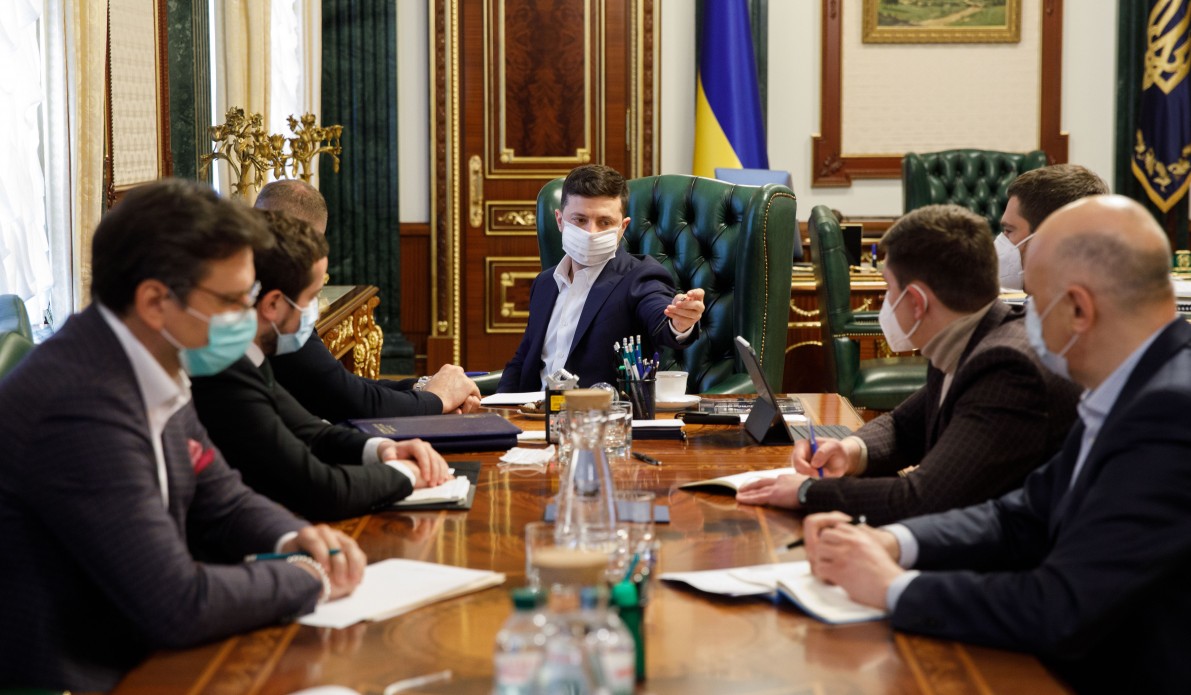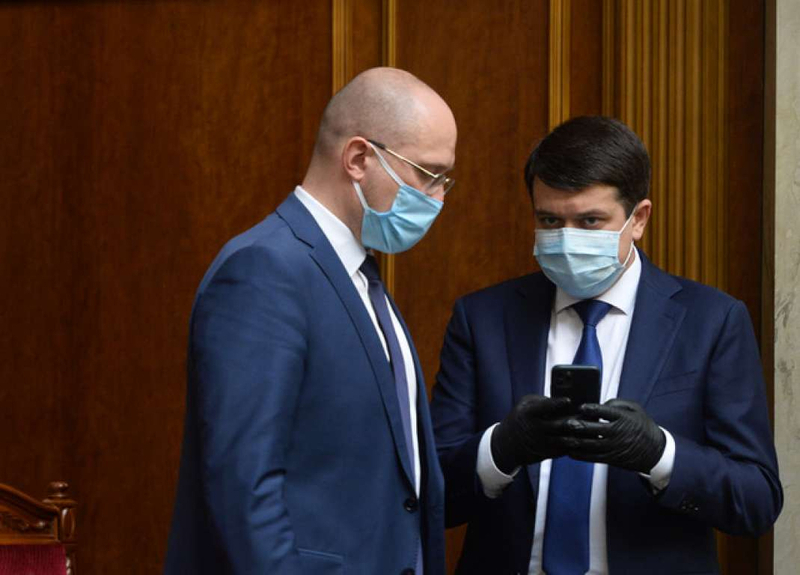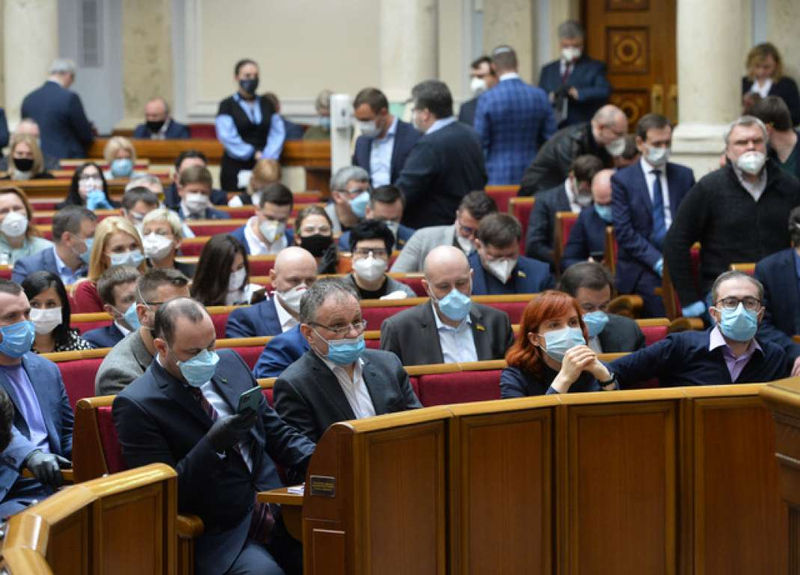In his popular comedy series Volodymyr Zelensky ridiculed the IMF. But politics is more pragmatic: now he was forced to push through parliament two controversial laws on demand of the same IMF. The law on land is highly unpopular. And the so-called anti-Kolomoisky law is heavily hampered by the bank tycoon's willing servants in parliament, who filed 16.000 amendments to the draft. Playtime is over for Zelensky. Ukraine needs the money, argues Mischa van Diepen.
 President Zelensky in his cabinet on April 14 2020 (picture President.gov.ua)
President Zelensky in his cabinet on April 14 2020 (picture President.gov.ua)
‘Go to hell’, or ‘идите в жо**’. With these words, President of Ukraine Volodymyr Zelensky sent the IMF-director off as a history-teacher-becomes-president in his popular comedy-series Sluha Narodu (‘Servant of the People’). Undoubtedly such scenes constructed Zelensky’s appeal to the Ukrainian people. This is the president they would like to see! A true servant of the people.
A year after his landslide victory over incumbent President Petro Poroshenko, Zelensky carries the burden of his previous job as a fictional president. To make ends meet, Zelensky is forced in the arms of the IMF bureaucrats he once ridiculed. The IMF conditions a loan of $8 bln on the passing of two controversial laws. The first law blocks the return of nationalized banks to their former owners, popularly known as the ‘anti-Kolomoisky law’, after Ukraine’s notorious oligarch whose PrivatBank was nationalized. The second law legalizes the sale of agricultural land, Ukraine’s most precious asset. As some deputies from his majority party Sluha Narodu deflected from their leader, Zelensky has looked for help in an unexpected direction: Poroshenko’s party European Solidarity. Is Zelensky selling his holy grounds?
No land for sale
Reforming the land market, Zelensky takes on a historically and culturally charged matter. After the fall of the Soviet Union, the lands of Ukraine’s former kolkhozes (collective state farms) were distributed among their workers. Three years of largely unregulated trading ended with a temporary ban on the sale of agricultural land, a moratorium, in 2001. Land can now only change hands through lease deals or inheritance.
The moratorium was prolonged each time it neared its end, out of fear of selling Ukraine’s dearest assets, its highly fertile black soil, to oligarchs and foreign corporations at a bargain, just like Ukraine was deprived of its industrial assets in the 1990s’ kleptocratic privatization. As phrased by Yuri Boyko, deputy of the pro-Russian Opposition Platform – for Life, that is ‘a straight road to slavery’.
But in the eyes of the IMF, the absence of a land market is responsible for a highly inefficient agricultural sector. The dispersed initial distribution of land plots, underdeveloped lease markets and persisting problems with the protection of ownership rights and contracts in Ukraine prevent land from finding its most efficient user. Access to finance is low as agricultural companies cannot use land as collateral for loans. Reports of the use of illicit means to grab land by the not-so-nices of Ukraine’s economy suggest a situation of rural Darwinism.
 Speaker of parliament Razumovsky (right) in the Rada (picture Rada)
Speaker of parliament Razumovsky (right) in the Rada (picture Rada)
Debates in Ukraine’s parliament, the Verkhovna Rada, depart from the IMF’s line of economic efficiency and instead address Ukraine’s collective memory. Sluha Narodu deputy Nikita Poturayev argued: ‘Ukraine is definitely burying communism. We are finally settling scores with this maniac Lenin and cannibal Stalin, who did everything to deprive the Ukrainian people from its dearest treasure – its land. We are returning the Ukrainians their land once and for all.’ After passing the bill in the first reading, President Zelensky thanked his deputies ‘for ending economic slavery’.
Spring has come
At the beginning of March, Zelensky stated that he would send his siloviki a calendar, ‘to remind [them] that outside, it’s already spring’. This refers to Zelensky’s campaign slogan: ‘Весна прийде - саджати будемо’. Out of context, this would translate into ‘Spring will come – we will plant [seeds]’, but Zelensky’s campaign staff intended: ‘Spring will come – we will seat [criminals in jail]’. A top candidate for jail among Zelensky’s voters was his predecessor, Petro Poroshenko. Many of the 73% that voted for Zelensky in the second round of the 2019 presidential elections despise Poroshenko and suspect him of having used his position to increase his personal riches.
However, spring had quite some surprises up its sleeve. Zelensky started off with an overhaul of his Cabinet of Ministers. Corona forced the country in a lockdown. Then, instead of locking Poroshenko up, Zelensky has formed a coalition with his predecessor to pass the controversial land market law and the ‘anti-Kolomoisky law’.
Whereas in the first reading of the land market law in November the simple majority of Zelensky’s Sluha Narodu sufficed, in the second reading this monocoalition broke. Some ‘servants’ deflected, pushing Zelensky to side with his familiar foo. Poroshenko’s European Solidarity sudden support for the law was much to the scorn of part of Zelensky’s electorate. Critiques suggest that Poroshenko’s siding with Zelensky must be a quid pro quo and suspect Zelensky of having granted Poroshenko a pardon.
The monocoalition collapses
As Zelensky won the presidency by a landslide in April last year and captured the Verkhovna Rada in early parliamentary elections in July, his rise to Ukraine’s highest office in much resembled his fictional presidency in Sluha Narodu. The inflow of parliamentarians without a political prehistory provided hope for a fresh breeze to blow through Ukraine’s political system. Could Zelensky finally break with Ukraine’s structures of vested interests and push through long awaited but frustrated reforms?
The March voting rounds have been a reality check; both for Zelensky and his voters. At the inception of his presidency, Zelensky was skeptically illustrated by some as a puppet of Igor Kolomoisky, the almighty oligarch and owner of the tv-channel on which Sluha Narodu aired. Now that Zelensky is instead satisfying the IMF’s demands and legally blocking the return of Kolomoisky’s PrivatBank to its original owner, the oligarch is suspected of having instructed his loyalists in Zelensky’s party to deflect. Rumors are that Kolomoisky’s people instructed or demanded that deputies would call in sick, cynically exploiting the current coronacrisis, to sabotage the legislative process.
 Deputies in masks celebrate the passing of two controversial laws at the session of 30-31 March (source rada.gov.ua)
Deputies in masks celebrate the passing of two controversial laws at the session of 30-31 March (source rada.gov.ua)
It is the question how durable this fallout with Kolomoisky’s people will be. Press agency Liga quotes an informant close to Zelensky downplaying the feud: ‘There is no serious fight with Kolomoisky. Today was just business.’ However, if Zelensky can also not count on his monocoalition to pass laws that do not directly touch Kolomoisky in the future, this obviously frustrates his power to rule directly. And this will be a blow to his appeal to those voters whose vote for Zelensky was a vote against the political establishment. His voters need to accept that the president will be involved in backroom politics with the political adversaries he once ridiculed to get things done.
At what price?
Only 21.4% of respondents in a poll conducted by the authoritative Razumkov Center would in a referendum vote in favor of establishing a land market and banning the current moratorium. Talks on the possibility of selling land in Ukraine thus remain grossly unpopular. Nonetheless, for the first time in two decades a majority has formed in the Rada in favor of this measure.
However, the final version of the law that was passed on 31 March came with so many amendments that its increases in economic efficiency are dubious. Until 2024 only real individuals can obtain land, with a cap of 100 acres. After, Ukrainian legal entities can join in with a maximum of 10.000 acres. At an unspecified moment in the future, a referendum will be held on the entrance of foreigners onto the land market. This hamstrung version of a land market would hamper the consolidation of big patches of land in the hands of efficient owners, the effect the IMF would like to see.
The second law in this controversial tandem, the ‘anti-Kolomoisky law’, is criticized for violating the authority of the judiciary in Ukraine. Kolomoisky and other former bank owners have appealed against the respective expropriations in protracted legal battles. Such cases are serious tests to the independence of the Ukrainian judiciary, tests that the judiciary will probably not pass. Judges are under serious pressure from the financially potent former owners on one hand and on the other hand the government fearing it has to return assets or financially compensate the former owners. The IMF’s condition calls for the legislative branch to intervene and guarantee that these banks will not return to their former owners.
Kolomoisky, who claims a $2 bln compensation for the expropriation of his PrivatBank, has put in all means to frustrate this legislative process. Next to splitting Zelensky’s Sluha Narodu in the first reading of the bill on 30 March, he had loyal deputies propose a record number of 16.000 amendments for the second reading. One deputy alone, former Sluha Narodu member Anton Polyakov, was responsible for 6.000 amendments, a number he probably did not reach without external help.
For the greater good
Zelensky’s role as President Holoborodka in the comedy-series Sluha Narodu shows a fight against corrupt bureaucrats, political elites, and the violation of Ukraine’s integrity by international partners like the IMF. Holoborodka made Ukrainians believe that finally they will rid their holy grounds of all these corrupt structures.
The recent turmoil in the Verkhovna Rada has shown that it is unfair to hold Zelensky to such expectations. Zelensky’s monocoalition is not immune to the influences of Ukraine’s business elites. Telling the IMF off is no option with the yawning gap in the country’s finances.
The enduring threat of Ukraine’s oligarchs and the West is part of the reason why Ukrainians so frantically hold on to their country’s dearest asset. Ukraine’s soil is more than a production factor. It is the motherland; the only element Ukrainians feel they have held onto throughout decades of corruption. Opening the land market, Zelensky is taking a huge but unavoidable electoral hit.
May it be clear that Zelensky has left the theater.
